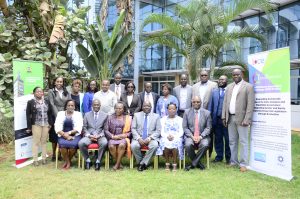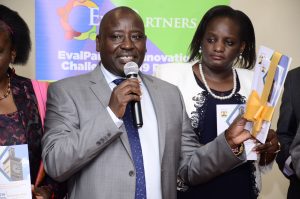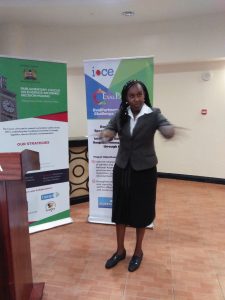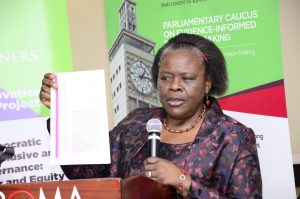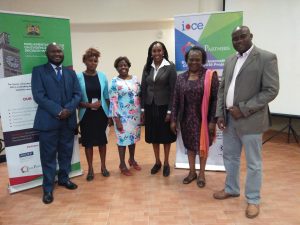Introduction
A team of evaluation actors from the Africa Gender & Development Evaluators Network (AGDEN) and the International Development Evaluation Association (IDEAS) in Kenya won the rigorous and competitive award from the IOCE and EvalPartners on the Innovation Challenge Project 2019. The title of the project is “Expanding Democratic Spaces for more Inclusive and Equitable Governance: Integrating Gender-Responsiveness and Equity-Focus into Legislation through Evaluation”. In collaboration with the Parliamentary Caucus on EvidenceInformed Oversight and Decision Making (PC-EIDM), the project implementation Team organised a Training Workshop for Parliamentarians on 9 August 2019, at the Boma Hotel, Nairobi, Kenya. The training workshop had four objectives: • To equip champions among parliamentarians with cognitive tools to better track (monitor) gender equity in policies, bills and programmes. To share information to strengthen knowledge and skills for parliamentary technical staff to effectively track (monitor) gender equality and equity in parliamentary activities as well as results of legislative programmes. To discuss how to improve the collection and use of monitoring and evaluation evidence for use by legislators and policy makers. • To amplify the importance of gender equality and equity-focused monitoring and evaluation in national development strategies i.e. Vision 2030, in alignment with the AU Agendas 2063 and the UN Agenda 2030.
The Parliamentary Workshop
The parliament utilized the first session of the workshop to officially launch the PC-EIDM Strategic Plan 2019/2023. The session was coordinated and moderated by Hon. Senator Petronila L. Were. The Chairperson of the PC-EIDM, Hon. Dr. Makali Mulu, reiterated the commitment of the Caucus in working with the partnership.
The partners and stakeholders at the strategic plan launch were urged to select the costed activities that they would support. This would help the Caucus in implementation some of the strategic plan activities. Hon. Dr. Makali Mulu, appreciated the role of the Parliamentary Service Commission (PSC) in facilitating the Caucus. He highlighted the role of Parliament and how this aligns with evidence. “The first role of parliament is that of legislation and for this, it is important to conduct research to generate evidence on what gaps exists” The second role is that of representation and for this, we need to share information about the numbers accessing development projects or interventions – there is need for data to inform effective representation. The third role of parliament is oversight and information as evidence is equally critical for this role. The parliament plays a critical role in budget making and this involves the use of data”. Hon. Dr. Makali, emphasized that all the roles mentioned cannot be carried without evidence. The role of the Caucus was therefore to create champions for evidence and the utilisation to inform policy. Representing the project implementation team, Dr. Florence Etta, spoke on the Colombo Declaration and the role of Parliaments on Evidence-Informed Decision-Making. She lauded the good working relationship with Parliament through Hon. Dr. Makali Mulu and the Parliamentary Caucus on Evidence-Informed Decision-Making Team, which he is the Chair. She congratulated the Caucus for being the Champions of Monitoring and Evaluation (M&E) in Kenya, as well as the whole of Africa. Mr. David Kiboi, the Acting Director of the Monitoring and Evaluation Directorate (MED), stressed on the leading role played by political leadership in enhancing evidence-informed decision-making. He explained that since the M&E Policy has been in draft form for over nine years awaiting to be passed by parliament, the Monitoring and Evaluation Directorate had reverted to tabling an M&E bill and requested the members of Parliament present to support the bill in parliament. Mr. Kiboi put emphasis on the development of Monitoring and Evaluation guidelines and stressed on the role of partnership for the realisation of this. In response to Mr. Kiboi, the Parliamentarians agreed to support the bill and promised to lobby for more Members of Parliament to pass the M&E bill and eventually the policy. The members of parliament agreed to raise a question in the house on the status of the M&E policy. The participants, welcomed the development of the M&E Guidelines to strengthen the institutionalization of the M&E practices. A senior Economist in MED, Mr. Jared Ichwara, highlighted the measures that the National Integrated Monitoring and Evaluation System (NIMES) has put in place to ensure that the Counties are using the systems through the County Integrated Monitoring and Evaluation System (CIMES). He highlighted the working relationships between the core Government agencies charged with evidence generation and utilisation namely the Kenya National Bureau of Statistics (KNBS) which produces the data; the Kenya Institute for Public Policy Research and Analysis (KIPPRA), which is an agency in the State Department for Planning charged with the responsibility of research and policy analysis; the Parliamentary Research Office (PRO) and the Parliamentary Budget Office (PBO) who consume the information produced. The mandate of MED is to bring together the evidence producers and users, including the Legislators.
The training commenced with Eddah Kanini, an M&E and gender consultant facilitating a practical session on the basics of Monitoring and Evaluation, the key evaluation concepts and Evaluation as a Key function of the Legislators and Parliament as a whole. The discussion also centered on the challenges faced by the Parliamentary Oversight in the gathering of evidence, Demand for evidence, the data itself and utilisation. She emphasized on the Power of Evaluation and how Parliament could Power Evaluation. During the session on Integrating Gender-Responsiveness and Equity-Focus into Legislation, Dr. Florence Etta shared the AGDEN Approach with an emphasis on the conceptual propositions on integration of norms, standards and key concepts namely: Empowerment, Participation, Inclusion, Non-discrimination, Accountability and Sustainability. She stressed on the need to include gender and power analysis; understand local laws; identify and address relevant duty bearers; engage, involve and strengthen the rights-holders. For the success of Gender-Responsiveness and EquityFocus there is need to apply the AGDEN/OECD DAC evaluation criteria and use participatory and mixed methods in all evaluations. The presentation by Dr. Etta brought out the linkages between the SDGs, agenda 2030 with its indicators and reporting mechanism and the Africa agenda 2063. In response to Dr. Etta’s presentation, participants felt that Parliament is more on equity responsiveness than gender responsiveness, yet both needed equal attention.
Way Forward
After the successful deliberations, the participants agreed on several activities moving forward. The partners who included the project team, MED, KIPPRA, UNWomen, AFIDEP, SDG network, SDG Caucus among others agreed to support the PC-EIDM in ensuring gender-responsiveness and equity-focus in evidence generation, demand and utilisation. Members agreed that, to strengthen institutionalization and sustainability of M&E championing, there was need to build capacity of the parliament staffs, particularly the Parliamentary Research Office (PRO). There will be more rigorous and timely communication between all actors on the data needed and data produced as well as timeliness and ease of access for information needed to strengthen the evidence use for policies and budget making in Kenya.
Author: Eddah Kanini
Pictures:
1. Group photo of all participants
2. Hon. Dr. Makali, (chair of the PC-EIDM) and Hon. Senator Petonila
3. Eddah conducting a training
4. Dr Florence during training
5. The project team- Won the IOCE and EvalPartners Innovation Challenge Award 2019
